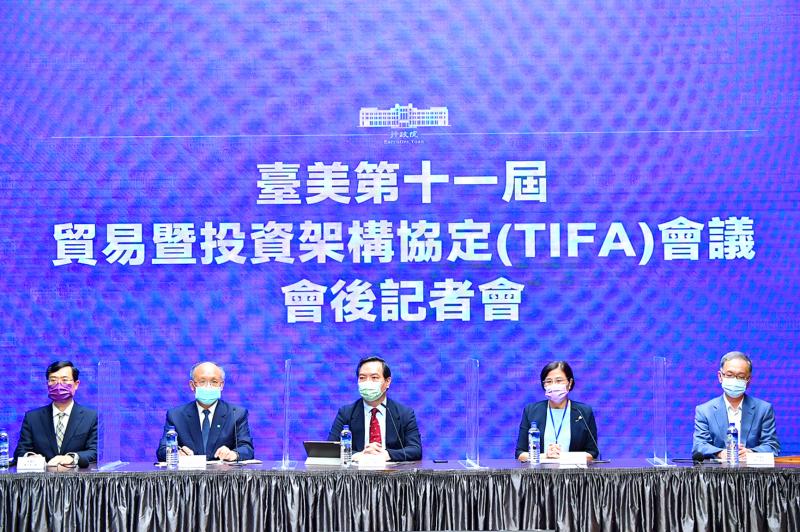After a five-year hiatus, the 11th Trade and Investment Framework Agreement (TIFA) trade talks between Taiwan and the US yesterday began with a virtual meeting, with the two sides agreeing to hold more “working groups” and to discuss a number of topics throughout the year to consolidate bilateral trade relations, government officials said.
“It’s a new page for US-Taiwan relations,” Executive Yuan spokesman Lo Ping-cheng (羅秉成) told an online news conference in Taipei.
The two sides discussed a range of issues, including technology supply chains, trade facilitation and digital trade, as well as the environment, intellectual property and labor rights, he added.

Photo courtesy of Executive Yuan
Minister Without Portfolio John Deng (鄧振中), who heads the Office of Trade Negotiations under the Executive Yuan, said that he was “thankful” for the eight-hour meeting, which ended at 3am Washington time.
TIFA participants included the representatives of various US government departments, including state, agriculture, labor and trade, as well as their Taiwanese counterparts via videoconference, a sign that the US “took relations with Taiwan very seriously,” Deng said.
“It’s been since 2016 when the last TIFA was held,” he said. “But three weeks ago, I met with US Trade Representative Katherine Tai (戴琪), and we made it happen.”
During the talks, it was agreed that there are to be more “working group meetings happening all year long” in a bid to clarify and consolidate further cooperation, Deng said.
“Just TIFA once a year is not enough,” he said.
Office of Trade Negotiations Deputy Trade Representative Yang Jen-ni (楊珍妮), who led the Taiwanese side of the meeting, echoed Deng’s sentiments.
“We talked about strengthening US-Taiwan supply chain cooperation from semiconductors to electric vehicles to vaccines,” Yang said. “The US representatives described the talks as ‘fully successful.’”
Topics in the meeting ranged from reducing agricultural tariffs, simplifying paperwork for the mutual trade of medical supplies, labor standards and digital trade, as well as environmental, social and governance goals, she said.
The lifting of a ban on the importation of US pork with traces of ractopamine in August last year was instrumental in warming US attitudes, and Taiwan was able to talk with the US in the spirit of full cooperation, Deng said.
“This is a very positive change in attitude that gives me hope that one day we reach our goal [of signing a bilateral trade agreement with the US],” he said.
When asked whether Chinese interference might challenge the US’ commitment to deepening economic cooperation with Taiwan, Deng said that US President Joe Biden’s administration sees Taiwan as an ally.
“Many US lawmakers wrote to the US president to urge closer US-Taiwan ties,” he said, “Taiwan has many friends in the US.”
Whether Taiwan is to receive more help from the US in terms of COVID-19 vaccines has been a hot topic.
At the news conference, Deputy Minister of Health and Welfare Hsueh Jui-yuan (薛瑞元) dismissed speculation regarding “chips for vaccines,” but said that Taiwan has asked for US approval to manufacture US vaccines.
“We asked to be more involved in the vaccine supply chain,” Hsueh said. “The US side replied that that would be something that could be discussed in a working group meeting.”

A magnitude 5.6 earthquake struck off the coast of Yilan County at 12:37pm today, with clear shaking felt across much of northern Taiwan. There were no immediate reports of damage. The epicenter of the quake was 16.9km east-southeast of Yilan County Hall offshore at a depth of 66.8km, Central Weather Administration (CWA) data showed. The maximum intensity registered at a 4 in Yilan County’s Nanao Township (南澳) on Taiwan’s seven-tier scale. Other parts of Yilan, as well as certain areas of Hualien County, Taipei, New Taipei City, Taoyuan, Hsinchu County, Taichung and Miaoli County, recorded intensities of 3. Residents of Yilan County and Taipei received

Taiwan has secured another breakthrough in fruit exports, with jujubes, dragon fruit and lychees approved for shipment to the EU, the Ministry of Agriculture said yesterday. The Animal and Plant Health Inspection Agency on Thursday received formal notification of the approval from the EU, the ministry said, adding that the decision was expected to expand Taiwanese fruit producers’ access to high-end European markets. Taiwan exported 126 tonnes of lychees last year, valued at US$1.48 million, with Japan accounting for 102 tonnes. Other export destinations included New Zealand, Hong Kong, the US and Australia, ministry data showed. Jujube exports totaled 103 tonnes, valued at

BIG SPENDERS: Foreign investors bought the most Taiwan equities since 2005, signaling confidence that an AI boom would continue to benefit chipmakers Taiwan Semiconductor Manufacturing Co’s (TSMC, 台積電) market capitalization swelled to US$2 trillion for the first time following a 4.25 percent rally in its American depositary receipts (ADR) overnight, putting the world’s biggest contract chipmaker sixth on the list of the world’s biggest companies by market capitalization, just behind Amazon.com Inc. The site CompaniesMarketcap.com ranked TSMC ahead of Saudi Aramco and Meta Platforms Inc. The Taiwanese company’s ADRs on Tuesday surged to US$385.75 on the New York Stock Exchange, as strong demand for artificial intelligence (AI) applications led to chip supply constraints and boost revenue growth to record-breaking levels. Each TSMC ADR represents

TRUST: The KMT said it respected the US’ timing and considerations, and hoped it would continue to honor its commitments to helping Taiwan bolster its defenses and deterrence US President Donald Trump is delaying a multibillion-dollar arms sale to Taiwan to ensure his visit to Beijing is successful, a New York Times report said. The weapons sales package has stalled in the US Department of State, the report said, citing US officials it did not identify. The White House has told agencies not to push forward ahead of Trump’s meeting with Chinese President Xi Jinping (習近平), it said. The two last month held a phone call to discuss trade and geopolitical flashpoints ahead of the summit. Xi raised the Taiwan issue and urged the US to handle arms sales to